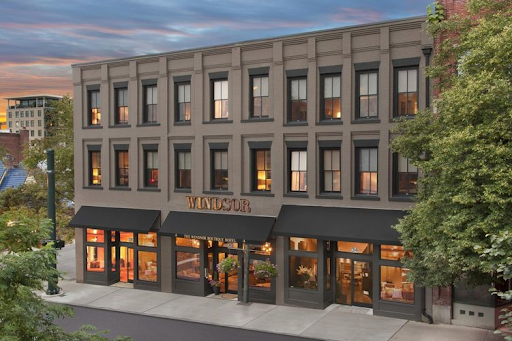New hotel development in the City of Asheville should have less impact on nearby neighborhoods and provide more benefits to the community under new regulations approved by City Council Feb. 23.
Prior to adoption of the new regulations, City Attorney Brad Branham explained to Council that North Carolina law does not allow municipalities to outright ban future hotel development; however a temporary pause in the development review process was permitted in order to give the City time to study the issue and devise new development standards.
During the year and a half hotel development moratorium, City staff consulted the community, relevant boards and commissions and Council numerous times to get feedback and refine the regulations that ultimately passed. The new rules will be further evaluated after six months to ensure they are working as intended.
Among other things, the new regulations require developers to provide a minimum level of public benefits, depending on the size and location of their project, through what is called a Public Benefits Table. The goals of the table are to help mitigate the impacts of hotel development and also leverage hotel development to meet City Council goals and address community needs.
Using a points-based system, hotel developers can choose from a menu of options that include items such as adaptive reuse of an historic building, donation to a City affordable housing or reparations fund, provision of living wages or contracting with women- or minority-owned businesses. The table requires that at least 50% of the points must come from contributions to affordable housing or reparations, as these are a high priority needs for the City.
The regulations are also designed to improve transparency and predictability in the development process. They include an option that “requires” public benefits in exchange for a staff-level review instead of City Council review. All new hotels will also be required to be reviewed by a new Design Review Committee, which will continue to allow public input.
For example, a 100 room hotel in downtown Asheville would need to either contribute $400,000 to either the Housing Trust Fund or a Reparations Fund, or build 10 affordable for sale housing units, plus choose from a menu of other benefits such as supporting the Business Inclusion program or providing living wages in order to get approval at the staff level. They must also meet all the other development standards and get approval from the Design Review Committee to go forward. If they can’t meet these requirements then the project would require Council review for approval.
“The Public Benefits Table was based on research and analysis of various incentive-based programs in other cities. The benefits are intended to capture City Council priorities related to equity and sustainability, in addition to other community needs, such as public art and public parking,” said City Planning and Urban Design Director Todd Okolichany. “The table is innovative for North Carolina, as it includes benefits not found in any other North Carolina city, such as the reparations fund benefit and negative points for displacing businesses and residents.”
How we got here
Since 2015, over 1,300 new hotel rooms have opened in the City of Asheville and a total of over 2,700 rooms have been approved. Due to this influx, mounting community concern led Council to impose a temporary one year moratorium on new hotel applications on Sept.24, 2019, so the City could study community impacts of hotel development and create a more effective development review process. The moratorium was extended on Sept. 22, 2020, and expires on Feb. 23.
The City contracted with the Urban Land Institute (ULI) to study the issue that also included a detailed briefing report prepared by City staff. ULI then conducted a robust community engagement process and followed up with a written report which was presented to the community in early 2020.
Following a work session in February 2020, City staff then went to work on developing the new regulations which were intended to meet the following goals:
- Enhance predictability and transparency in the hotel development review process;
- Establish appropriate areas for new hotels based on several criteria; and
- Incentivize community benefits and improve the design of hotels.
Once the basic framework was in place, the city conducted a community survey and further engaged with stakeholders to test the framework. Two City Council work sessions followed, on Oct. 13 and Oct. 27, 2020, in which Council heard recommendations and gave staff direction on ways they would like to see the proposed regulations further modified prior to coming before Council for a vote.
New hotel development regulations
Three primary components of the new regulations include:
- Creation of a new Hotel Overlay District that identifies where new hotels may be built and includes new hotel development standards intended to address site, building and operational requirements and meet key community goals;
- A strong incentive to incorporate high-priority public benefits, such as contributions to a reparations fund and affordable housing; support for minority- and women-owned business Enterprises; and options for living wages and green building elements; and,
- A revised design review process that promotes (or preserves) quality architecture and building design, and enhanced placemaking.
Other components of the revisions include:
- A revised design review process that combines design review subcommittees of the Downtown and Asheville Area Riverfront Redevelopment Commissions into one joint Design Review Committee.
- Updates to the definitions for large and small hotels, establishing a new threshold for large hotels at 36 or more guest rooms; and
- Updates to the definition of an extended stay hotel and a new definition for a guest room.
Here are links to the documents presented to Council at the Feb. 9 meeting:
Hotel Development Standards Text Amendments- Staff Report to City Council
Hotel Overlay District Map Amendments – Staff Report to City Council
Follow-up memo to City Council:
